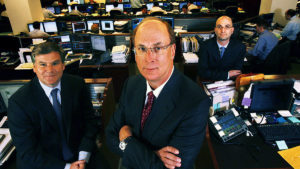Ron DeSantis and Vivek Ramaswamy may have failed to charm Republican voters, but their wildly successful war on “woke capitalism” has taken on a life of its own. And the two most controversial three-letter acronyms in American life — DEI (diversity, equity, and inclusion) and ESG (environmental, social, and governance) — are on the run.
Signs of revolt are everywhere. Last month, The New York Times led with a story headlined “Inside the Anti-DEI Crusade”, which reported that “more than 20 states considered or approved new laws taking aim at DEI” in 2023. BlackRock, a pioneer of ESG investing, just announced mass layoffs in its ESG division. It was recently discovered that assets under management in ESG had declined by $5 trillion over two years.
This string of victories might suggest that the swift “de-wokeification” of business is not far off. After all, the C-Suite represents the only locus of power in American life to have a documented Right-leaning bias. One study last year found that registered Republicans outnumbered Democrats among top-earning executives in S&P 500 companies by a margin of 69% to 31%. It seems logical enough, then, to attribute the relentless equity, gender and climate activism of American businesses over recent years to pressure from a shareholder base, media and society in the throes of a sociocultural maelstrom. It would seem equally logical to predict that as this maelstrom subsides, managers will return to their traditional role of maximising shareholder returns, while leaving the political realm to elected politicians.
But wishful thinking will only lead to disappointment. Such optimism depends on the tenuous assumption that business leaders, when left to their own devices, will lead their businesses the way they vote. In today’s America, that would require them to be willing to see their own elite position severely curtailed or taken away entirely. And to give up one’s status for one’s values is a bigger sacrifice than most people are willing to make.
To be sure, C-Suite positions accord their holders wealth and status within a company or an industry. But that most tantalising of emoluments — social status — is doled out by other institutions, most notably media, academia and government, all of which have a decidedly different political orientation from the C-suite. It is, therefore, no surprise that, even while Republican executives outnumber Democrats by more than 2-1, the CEOs whose wisdom is most regularly exalted in the mass media — say, Warren Buffett of Berkshire Hathaway, Bob Iger of Disney, or Larry Page (formerly) of Google — are Democrats. Meanwhile, Right-leaning CEOs and founders too powerful for the media to ignore — say, Elon Musk or Peter Thiel — are cast as out-of-touch, if not a bit sinister.
If this isn’t enough to remind a CEO which side his bread is buttered, he can consider the recipients of those most golden of post-retirement parachutes, Distinguished Professorships at Harvard or the Wharton School of Business. (As an ex-employee of the former, I can vouch that the ideology of its practice-based faculty mirrors Buffett’s far more closely than Musk’s.) Or he can observe which titans of finance are awarded honorary doctorates or deliver homilies at the World Economic Forum (WEF) in Davos, the Aspen Institute, and the Munich Security Conference.
Beyond the quest for status, there are more quotidian considerations that encourage business leaders to stay the course with DEI and ESG. Every year, as America’s regulatory state grows, so does American businesses’ dependency on the good will of regulators and government partners. And once one penetrates below the rank of presidential appointees — even if November brings a second Trump Administration — the political makeup of regulators is overwhelmingly Democratic. Many CEOs will conclude that running afoul of regulators to satisfy their personal values simply isn’t worth it.
For the first time in years, shareholders and investors are fighting back against the American C-suite. It’s too late, however, for their revolt to have a deep and durable impact on company behaviour. That is because the shareholder is no longer king in American business, and he hasn’t been for a long time. The “stakeholder” is.
In American business law, the cornerstone of fiduciary duty is the business judgment rule (BJR), which stipulates that managers are exempted from legal liability for violating their duty to the shareholder, provided that they act “in good faith”, in the company’s interest. Classically, “the company’s interest” has been defined narrowly as maximising shareholder returns. Over the past decade, however, the definition of a company’s “interest” has been quietly expanded — in sources ranging from the Harvard Law School Forum on Law and Governance to that consummate arbiter of business conventional wisdom, Investopedia — from shareholder benefit to “stakeholder” benefit.
What is a stakeholder? Pioneered by WEF Chairman Klaus Schwab decades ago, the term refers to any “party that has an interest in a company and can either affect or be affected by the business”. The term is wide enough to encompass not only shareholders, but employees, customers, government regulators, communities, entire nations, even the whole world. Under the stakeholder system, there is no hierarchy, no order in which the different stakeholders must be served. It is — critically — so slippery a concept that virtually any business decision can be justified on the grounds that it benefits one stakeholder or another. In this way, it accords unprecedented power to managers, who, by virtue of their positions, can claim an understanding of stakeholders’ needs shared by no one else.
Stakeholderism enables managers to do two things that were far more difficult under the conventional shareholder model: first, to pursue ends other than profitability without running afoul of the BJR; and second, to avoid personal responsibility for unpopular business decisions by claiming that other “stakeholders” have demanded them. If they are to win the corporate battle against DEI and ESG, therefore, shareholders need to be ready to recognise and resist three common “stakeholder” dodges: employee activism, consumer activism and government regulations.
Let’s start with employee activism, which refers to pressure exerted on managers by company employees to adopt or reject a certain policy or position. Employee activism is a real concern for managers at many companies, particularly those in industries that attract politically engaged young people. But it is also easily exploited by managers for their own ends. This is due to a fundamental asymmetry in information: managers know what their employees are saying, but the public — and even shareholders — largely do not. Therefore, when a manager justifies a policy decision on the grounds that key employees threatened to leave the company if they decided differently, who is to say that they didn’t?
Take Disney, an expert in the use of employees as a corporate shield. In 2022, in response to a new set of education regulations related to sexuality in the company’s home state of Florida (monikered as the “Don’t Say Gay” bill), the company capitalised on employee activism to oppose the law. Following a series of walkouts by some employees, Disney’s various outlets issued statements condemning the law, such as this tweet by Disney+: “We strongly denounce all legislation that infringes on the basic human rights of people in the LGBTQIA+ community — especially legislation that targets and harms young people and their families.” Disney subsequently committed to ceasing all political donations within the state of Florida, donated to the Human Rights Campaign, and included a gay kiss scene in the upcoming movie Lightyear.
The narrative, as widely reported, was that Disney employees had acted en masse to persuade their bosses to take a stand against bigotry following an insufficiently indignant reaction from CEO Bob Chapek. But there was another side to the story which only received coverage in conservative media outlets. It turned out that a group of conservative-leaning employees at Disney had also written an open letter to management, urging Disney to remain “politically neutral” and arguing that the company “shouldn’t be a vehicle for one demographic’s political activism”. Disney, they added, had created an oppressive political culture within the company: “Employees who want [Disney] to make Left-wing political statements are encouraged, while those of us who want the company to remain neutral can say so only in a whisper out of fear of professional retaliation.”
Here were two groups of Disney employees taking contradictory positions. But when Disney management sought to express “solidarity” with its employees, it did so by capitulating totally to the first group while ignoring the second. And yet, if a shareholder irate over Disney’s antagonism of its home state, its governor and legislature were to take management to court for violating their fiduciary duties, he would have faced a severe uphill climb. After all, Disney’s employed “creatives” mean the difference between industry leadership and falling behind. And when it comes to what those employees really want, or whether one group of dissenting employees poses a greater threat to the company than another, who is in a better position to decide than the managers? This was none other than a victory for managers over shareholders, using employee activism as a shield.
Indeed, as if to demonstrate just how fully he has internalised this principal, Iger, responding to a separate imbroglio over the restrictive 2019 abortion law in Georgia, speculated portentously: “I think many people who work for us will not want to work there, and we will have to heed their wishes in that regard.” Quartz, reporting on Iger’s comments at the time, asked: “Was this another victory of sorts for employee activism before employees even acted?” This was the wrong question. It was, rather, another victory for managers over shareholders, using employee activism as a shield.
The principle can also apply to customer activism. While customer feedback can be more public than employee sentiment, much of it is also proprietary — collected through meetings and correspondence with clients or customer surveys. The prerogative of packaging this information and determining how it should influence company behaviour falls to managers. The same goes for government regulations. When the task of interpreting the regulatory climate is left solely to managers, they can very easily end up passing off their own political aims as regulatory risks, or even lobbying behind the scenes for the very regulations that they present to their boards as regrettable faits accomplis.
The long-and-short of it is that shareholders are in a far weaker position compared with a decade ago. Their only avenues to influence company policy now are through questions brought to corporate boards, and through the hiring and firing of managers and board members. If they are to fight back, they must learn to use those avenues to maximum effect. Firstly, by demanding thorough proof from managers every time a decision is attributed to the needs of a “stakeholder”, to make sure it’s not another dodge. And then, by hiring and firing managers and board members based on who will prioritise benefit to shareholders, rather than their public image or personal political aims.
Managers will always feel the urge toward “mission creep” from the purely commercial to the political. When they succumb to it, the democratic process surrenders to what the sociologist C. Wright Mills once termed a “power elite” — an amalgamation of public and private sector that offers us a single orthodoxy rather than a marketplace of ideas or products. Shareholder capitalism is democracy’s vital firewall between the public and private sector, and it is under threat. It is nothing less than the patriotic duty of all American investors and board members to reinforce it for the protection of our republic.
Disclaimer
Some of the posts we share are controversial and we do not necessarily agree with them in the whole extend. Sometimes we agree with the content or part of it but we do not agree with the narration or language. Nevertheless we find them somehow interesting, valuable and/or informative or we share them, because we strongly believe in freedom of speech, free press and journalism. We strongly encourage you to have a critical approach to all the content, do your own research and analysis to build your own opinion.
We would be glad to have your feedback.
Source: UnHerd Read the original article here: https://unherd.com/




